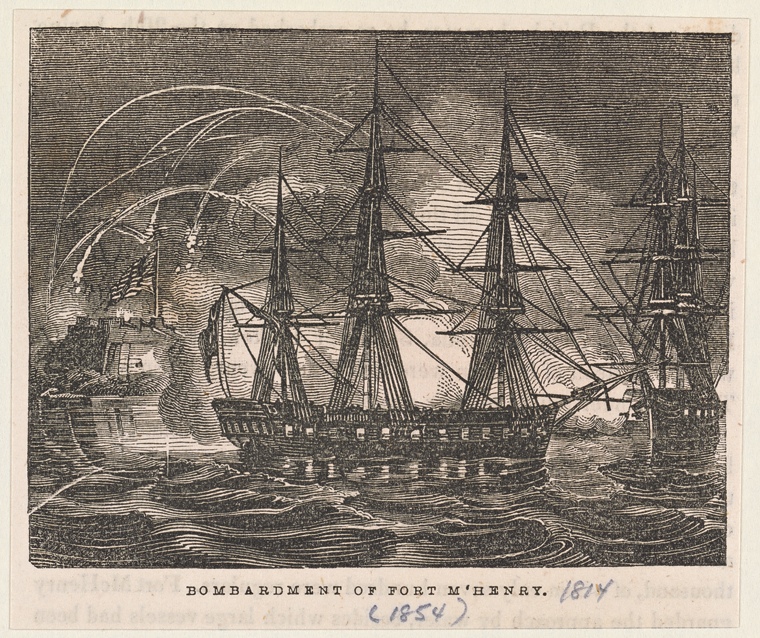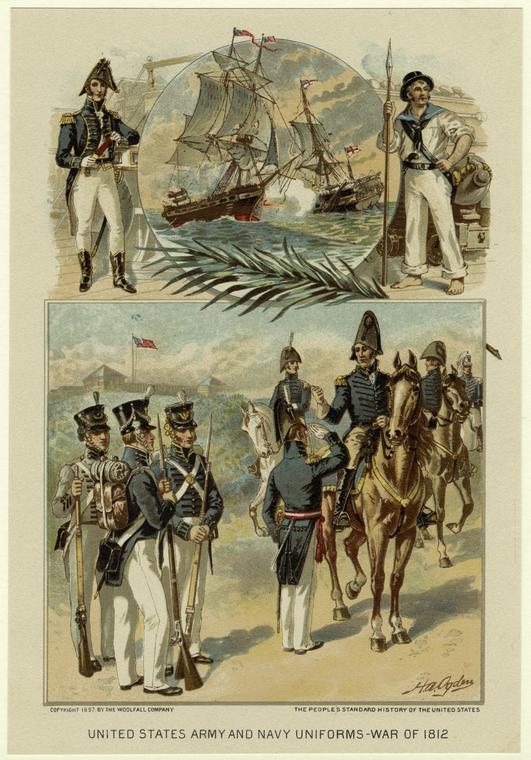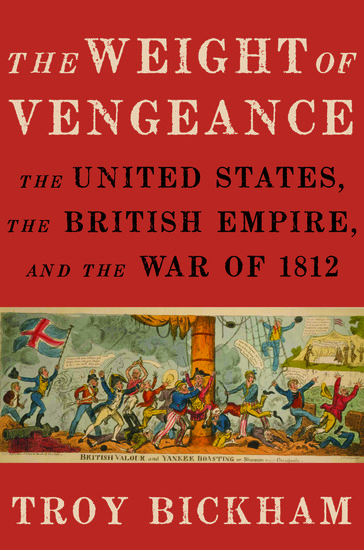By Troy Bickham
As North America begins to mark the bicentennial of the War of 1812, it is worth taking a brief moment to reflect on those who opposed the war altogether. Reasons for opposing the war were as diverse as justifications for it. Ideology, religious belief, opportunism, apathy, and pragmatism all played roles. Unlike Europeans caught up in the Napoleonic Wars ravaging that continent, the vast majority of free males in North America had — whether by right of law or the by the fact that military service was easy to avoid — choice of whether or not to participate. And, interestingly, most of them chose not to participate.
Like all wars, the War of 1812 is shrouded in myths and legends. One is the myth of American perseverance and bravery celebrated in the US national anthem (based on Francis Scott Key’s poem in the wake of the British naval bombardment of Fort McHenry at Baltimore in 1814). The reality is that the Americans lost most of their battles, and far more often than not they retreated or surrendered after suffering light casualties. At the start of the war, William Hull led a US invasion force into Canada. After meeting moderate resistance, which his force outnumbered, he quickly retreated back to a well-supplied fort at Detroit and then promptly surrendered it, the Michigan Territory, and all American troops and militia in the territory in a matter of days. A furious Thomas Jefferson remarked to President James Madison that “Hull will of course be shot for cowardice and treachery.”

Another myth is that ordinary Canadians rallied around the British standard to heroically thwart a series of invasions from the US and gave birth to Canadian nationalism in the process. While the invasions were stifled, military historians have long credited this to the poor quality of the US forces and to the superior organization of the small force of British troops defending Canada. While there are numerous recorded actions of Canadian heroism, the truth is that the vast majority of eligible men avoided their legal obligation to serve in the militia. In fact, the Francophone population rioted when the militia was called up in Quebec. The largest turnout of the militia of Upper Canada (now largely Ontario) in the war came following the US capture of what is now Toronto. But they didn’t show up to fight. Instead, they appeared after the brief battle to accept the US Army’s offer of a parole to any militiaman who surrendered. A parole was a legally recognized document by which a combatant was released on his promise not to fight in the war (effectively a pass to sit out the remainder of the war).
The truth is that the War of 1812 was a conflict that few wanted. Not a single member of the Federalist party in Congress voted for a declaration of war. Governors and legislatures of New England states, where the Federalists were strong and anti-war sentiment even stronger, announced statewide days of fasting and prayer in mourning. In a public address sent to Congress in the response to the declaration of war, the Massachusetts House of Representatives declared that: “An offensive war against Great Britain, under the present circumstances of this country, would be in the highest degree, impolitic, unnecessary, and ruinous.” New England clergymen used their pulpits to rail against the war and discourage young men from service, with such ministers as Nathan Beman of Portland describing the army camps as “the head quarters of Satan.”

Few suffered more than the group that defended Alexander Contee Hanson’s right to publish the flamboyantly anti-war Federal Republican paper in Baltimore in June 1812. A heavily-armed group defended the publishing house against a riotous Baltimore crowd that boasted an artillery piece manned by none other than the editor of the rival Sun newspaper. When the affair ended, one of the defenders was dead and eleven more were physically broken following hours of physical torture. These were hardly anti-American radicals. Among the severely wounded was Henry “Light-Horse Harry” Lee: Revolutionary War hero, former governor of Virginia, and father to the Confederate army general, Robert E. Lee. The dead man was James Lingan, another Revolutionary War veteran and former senior officer of the Maryland State Militia. George Washington’s adopted son, George Washington Parke Custis, gave the funeral oration.
While the war was less divisive amongst the political elites of the British Empire, a number of politicians spoke out against the war. In open debate in the House of Commons, one member called the war “a great evil,” while another lamented that Britain’s mean-spirited “detestation of liberty” and jealousy of post-revolutionary America’s success drove Britain into an unjust war. In Upper Canada, the provincial assembly initially refused to grant the commanding British general emergency powers for fear, at least according to the general, that resisting an American invasion would only agitate the invaders. Some Canadian legislators actually joined the US forces, and then raised and led Canadian troops on the side of the US.
Most North Americans on either side of the Canadian border were far less vocal in their opposition to the war. They simply refused to participate. Despite adding tens of thousands of troops to its paper army each year, the US never met its pre-war recruitment goal of 30,000 men. Desertion was rife in the British Army, which ran short on supplies throughout the hard Canadian winter, just as it was in the US Army, particularly when the bankrupt US government could no longer afford to pay or feed its soldiers in the last year of the war. Often backed by their governors, state militia regularly refused to cross borders, particularly when it meant fighting the enemy on the other side. A furious Madison tried but failed to place them under federal authority. The militia in Canada was not substantially different. Most men refused calls into service and those who did typically deserted by the autumn harvest. In order to persuade the militia in his command to march on the invading Americans in the summer of 1812, the British commander of Upper Canada had to trick the men into thinking they were simply going on an exercise.

George Cruikshank, “State Physicians Bleeding John Bull to Death!!” In one of innumerable public complaints about high taxes in Britain, this image shows John Bull, the personification of the British people, is being bled, or taxed, to death in order to support the massive military establishment that surrounds him. The British taxpayer proved to be one of the most influential opponents of the war. Fed up with decades of unprecedented levels of taxation, they demanded that Britain’s war machine be dismantled. Fearing a backlash of angry taxpayers if it continued the war, the British government signed a quick status quo antebellum treaty with the US in late 1814 — despite that the fact that Britain had tens of thousands of veteran troops massing in Canada, complete control of the seas, and the US government was bankrupt and unable to pay its dwindling army.
So as guns fire, re-enactors march, and replica ships set sail, remember that what we are recollecting is an important but ultimately just a small slice of the story of the War of 1812. A better representation might be the inhabitants of Nantucket. After public deliberation, a delegation from the island approached the British in the summer of 1814 and signed their own separate peace agreement, whereby the islanders would no longer pay federal taxes or fight in the war and Britain would release any of the island’s men being held prisoner and no longer molest its ships.
Troy Bickham is an Associate Professor of History and a Ray A. Rothrock Fellow in the College of Liberal Arts at Texas A&M University. He is the author of The Weight of Vengeance: The United States, the British Empire, and the War of 1812, Making Headlines: The American Revolution as Seen Through the British Press, and Savages within the Empire: Representations of American Indians in Eighteenth-Century Britain.
Subscribe to the OUPblog via email or RSS.
Subscribe to only American history articles on the OUPblog via email or RSS.
View more about this book on the ![]()
![]()




[…] hand, Troy Bickham points out at the Oxford University Press blog that the way we remember the war elides all opinions about it other than its triumphs and heroisms: The truth is that the War of 1812 was a conflict that few […]
The war should never have occured but it’s effects on the British at home were just as widespread:
http://priorieshistoricalsociety.blogspot.co.uk/2012/04/article-sheffield-food-riots-1812.html
[…] made and re-made both daily at sporting events, high school graduations, and political rallies. The song has its origins in a particular time, place, person and event, yet its import derives from countless performances over the past century and more. Its history […]